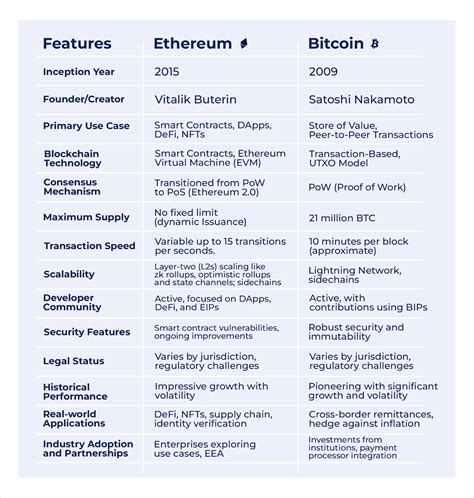Understanding The Basics Of Bitcoin Vs Ethereum
When diving into the world of cryptocurrency, it’s essential to grasp the fundamental differences between Bitcoin and Ethereum, the two giants of the blockchain space. Bitcoin Vs Ethereum extends beyond mere coins; they represent different technological approaches and use cases.
Bitcoin was created in 2009 by an anonymous entity known as Satoshi Nakamoto. It operates primarily as a digital currency, aimed at decentralizing finance by enabling peer-to-peer transactions without the need for intermediaries like banks. Its primary features include limited supply, security via proof-of-work, and a focus on being a medium of exchange and a store of value.
On the other hand, Ethereum, launched in 2015 by Vitalik Buterin and his team, is not just a cryptocurrency but a platform that allows developers to build decentralized applications (dApps) using smart contracts. While Ether (ETH) is the native currency of the Ethereum network, the platform’s versatility extends its applications beyond currency to include things like decentralized finance (DeFi) and tokenized assets.
While both Bitcoin and Ethereum are leaders in cryptocurrency, their foundational principles and technological applications distinguish them significantly. Understanding these basics is crucial for anyone looking to invest or engage with these digital currencies moving forward.
Key Differences Between Bitcoin And Ethereum Explained
When comparing Bitcoin Vs. Ethereum, it’s essential to highlight the key differences that set them apart in the cryptocurrency landscape. Both Bitcoin and Ethereum serve unique purposes and have distinct characteristics, which significantly influence their applications and user bases.
- Purpose: Bitcoin was created primarily as a decentralized digital currency, aimed at facilitating peer-to-peer transactions without the need for intermediaries. In contrast, Ethereum was developed as a platform for decentralized applications (dApps) and smart contracts, allowing developers to build a wide range of applications on its blockchain.
- Smart Contracts: One of the most notable features of Ethereum is its capability to execute smart contracts, which are self-executing contracts with the terms directly written into code. Bitcoin, while it allows basic scripting, does not support complex smart contracts, making Ethereum more versatile for developers.
- Transaction Speed: Another difference lies in transaction times. Bitcoin’s block time averages around 10 minutes, whereas Ethereum’s is approximately 15 seconds. This rapid transaction speed can be advantageous for Ethereum users when executing trades and interacting with dApps.
- Supply Limit: Bitcoin has a capped supply limit of 21 million coins, which introduces scarcity and is a fundamental part of its valuation strategy. Ethereum, however, does not have a fixed supply limit, as its monetary policy is subject to change and is designed to support ongoing development and network needs.
- Consensus Mechanisms: Bitcoin primarily utilizes Proof of Work (PoW) to validate transactions and maintain network security, which can be energy-intensive. Ethereum is in the process of transitioning to Proof of Stake (PoS) with the Ethereum 2.0 upgrade, promising improved energy efficiency and scalability.
- Development and Community: The development communities for Bitcoin and Ethereum differ significantly. Bitcoin development is more focused on stability and security, often making changes slowly and cautiously. Conversely, Ethereum embraces innovation, regularly implementing upgrades and enhancements to support dApp developers.
Understanding these differences is crucial for anyone looking to make informed decisions in the world of cryptocurrencies. While both play significant roles in the digital economy, Bitcoin Vs. Ethereum cater to distinct audiences and technological needs.
Investment Potential: Bitcoin Vs Ethereum Performance Comparison
When assessing the Bitcoin Vs Ethereum debate, investment potential plays a critical role for many investors. Both cryptocurrencies have demonstrated significant growth over the years, but they cater to different investment strategies and risk appetites.
Bitcoin, often referred to as digital gold, has shown remarkable price stability compared to other cryptocurrencies. Its primary use case revolves around being a store of value, which attracts conservative investors. The total supply of Bitcoin is capped at 21 million coins, which creates scarcity and potentially supports its long-term price appreciation. Over the last decade, Bitcoin’s price has experienced exponential growth, particularly in bull markets. Investors have seen substantial returns, bolstered by the adoption of Bitcoin by institutional investors and large corporations.
In contrast, Ethereum has emerged as a multifaceted platform that supports smart contracts and decentralized applications (dApps). The investment potential in Ethereum is largely driven by its technological advancements and the promise of real-world applications. Unlike Bitcoin, Ethereum does not have a fixed supply, although the transition to Ethereum 2.0 is making the network more efficient and is expected to impact the tokenomics positively. Investors are drawn to the potential for Ethereum to power the next wave of digital innovation.
Performance-wise, historical price action shows that Ethereum can be more volatile than Bitcoin, leading to heightened risks but also opportunities for higher short-term gains. For example, during the 2021 bull run, Ethereum’s price surged substantially, outperforming Bitcoin over specific periods. This volatility can appeal to risk-tolerant investors seeking significant profits from their investments.
The decision to invest in Bitcoin or Ethereum should align with an individual’s financial goals, risk tolerance, and investment horizon. While Bitcoin may appeal to those favoring stability and long-term value, Ethereum offers a compelling case for those interested in growth potential derived from innovative technologies.
To summarize:
- Bitcoin: A stable investment seen as digital gold, appealing to conservative investors with a focus on long-term appreciation.
- Ethereum: A highly versatile platform with the potential for high returns through its smart contract capabilities and dApp ecosystem, suitable for those who can withstand volatility.
Future Trends: What To Expect From Bitcoin Vs Ethereum
As we look ahead to the future of cryptocurrency, both Bitcoin Vs Ethereum are poised to evolve significantly. Here are some emerging trends to watch:
- Regulatory Changes: The regulatory environment surrounding cryptocurrencies is expected to tighten, which may affect both Bitcoin Vs Ethereum differently. Investors will need to stay informed about any changes and adapt their strategies accordingly.
- Technological Advancements: Ethereum is particularly focused on upgrading its network, especially with the ongoing developments around Ethereum 2.0, which aims to improve scalability and reduce energy consumption. Bitcoin also continues to see improvements, with solutions like the Lightning Network aimed at addressing transaction speed and fees.
- Institutional Adoption: As institutional investment in cryptocurrencies grows, both Bitcoin Vs Ethereum may see increased demand. Institutions might favor Bitcoin for its safe-haven qualities, while Ethereum could attract interest for its smart contract and decentralized finance (DeFi) capabilities.
- Market Volatility: The cryptocurrency market is inherently volatile. Future trends indicate that both Bitcoin Vs Ethereum will experience significant price fluctuations, influenced by macroeconomic factors, technological milestones, and market sentiment.
- Environmental Impact: With increasing concerns over the environmental implications of cryptocurrency mining, particularly for Bitcoin, there may be a shift towards greener mining practices and technologies. Ethereum’s transition to a proof-of-stake (PoS) model could position it as a more sustainable option moving forward.
The future of both Bitcoin Vs Ethereum is promising yet uncertain, with numerous factors at play. Keeping a close eye on these trends will be crucial for investors and enthusiasts looking to navigate this evolving landscape.





